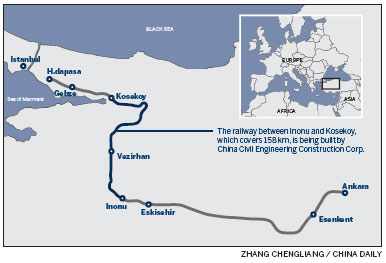Hiring locally
 |
Construction of Phase 2 began in 2008, but China Civil Engineering started its preparation as early as 2004 to win the bid for the project. Thirty companies, including some from Japan, South Korea and Europe, formed eight partnerships in the competition.
China Civil Engineering's partnership, with China National Machinery Import & Export Corp and two Turkish companies, Cengiz and IC Ictas, won the bid in December 2005. The contract was signed in July 2006.
A total of $1.27 billion was raised from both countries. China contributed $720 million in loans.
Now more than 1,000 laborers, technicians and support staff are working on the project. Just over 40 are from China, Zheng said. "We hope in the future to have only a few senior Chinese administrative staff here, leaving all other jobs to local people."
Talking about its future here, Zheng said the company is in discussion with Turkey about building a 2,000-km high-speed railway linking the border towns Edirne in the northwest, close to Bulgaria and Greece, and Kars in the northeast, near Georgia and Armenia.
"We are discussing with them. We want to cut the project into different phases and construct them one by one," he said.
Turkish State Railways, which is in charge of the country's HSR development, had not responded by deadline to a China Daily interview request on whether China would get more projects.
But according to the agency, Turkey plans to construct some 6,000 km of high-speed railway by 2023, the country's 100th anniversary.
The Ankara-Istanbul line is the country's first high-speed line. Phase 1, which runs more than 200 km from Ankara west to Eskisehir, was built by a Spanish company and opened in early 2009.
When the entire line opens, travel time between Ankara and Istanbul, the country's two largest cities, will shorten from seven hours to less than four.
Sino-Turkish ties
|
|
"HSR is just a beginning for further economic cooperation" between Turkey and China, said Selcuk Colakoglu, director of Asia-Pacific Studies at Ankara-based International Strategic Research Organization.
"Turkey has transformed itself from a security state to a trading state during the past decade. If you want to be a trading state, you should have a very developed transportation link." Colakoglu added that building HSR links throughout Turkey is "very important for a sustainable rapid development".
China's support in Turkey's high-speed rail would be "beneficial for both Beijing and Ankara", he said. "China seems a best alternative to build HSR with high-tech and reasonable cost, including financial support. I believe that some other strategic cooperation would follow construction of HSR."
Xiao Junzheng, political counselor at the Chinese Embassy in Ankara, said the $1.27 billion Phase 2 of the Ankara-Istanbul high-speed line is the two countries' biggest cooperative construction project.
"The project has enhanced the confidence of the Turkish government and market in Chinese technology," Xiao said.
He said the project will not only deepen Sino-Turkish economic cooperation, but also will bring "significant" benefits to Turkey's economic development. For example, Xiao said, the number of rail passengers between Ankara and Istanbul is expected to rise from 4,000 daily to 25,000 when the high-speed railway opens.
When asked if China would aim at more HSR projects in Turkey, Xiao said, "The Turkish market is a very big one, so it is not possible for it to be dominated by any single country or company. Also, the investment would be really big.
"China is just a latecomer in the construction market here," he said. "South Korea, Japan and Russia are all more active. But I believe Chinese companies can stand firm in Turkey's construction contract market with their technology strength and good credit."
Stefaan Van Kerchove contributed to this report from Brussels.
